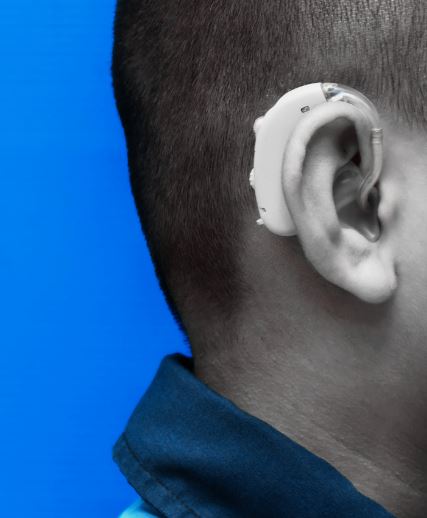I had a phone call last week from the mom of a 10th grader whose hearing loss I had identified at 5 weeks of age. He has what we called a “mild” hearing loss. (How I hate that word mild when referring to hearing loss; topic for another blog.) This young man, who we will call Jake, has decided not to wear hearing aids anymore.
He just doesn’t believe that he needs them. His parents disagree. His grades are dropping and the rest of the family is going deaf from the level of the TV.
School and Hearing Loss
Jake has know me for a long time and was willing to talk to me. I asked him how he was doing. He said “fine”. I asked about school, grades. He did not remember but looked them up and he had an A in History, B in Bio, and C’s in Math, English, and Spanish. I asked him what he thought about those grades.
He knew they were not great. We talked about what his goals were. He was not sure but knew he wanted to go to college. I asked him if he thought those grades would get him into a college of his choice. He knew they would not.
I asked him why he had stopped wearing his hearing aids. He said he didn’t like them. I asked if he was being bullied, or teased. He said no. (I am not sure he was being honest.) I asked if he didn’t like the way the hearing aids looked, or felt, or sounded. We discussed if a different type of hearing aid would make him feel better – maybe an in-the-ear or in-the-canal aid? He said no. Then I showed him is audiogram. Drawing the audiogram onto the speech banana with the phonemes displayed is very powerful.
I was able to show him that with his hearing loss of around 40 dB, he was missing a lot of speech information at normal conversational levels, and was not even hearing speech at soft conversational levels. He was stunned.
Why Kids with Hearing Loss Need to Wear Their Hearing Aids
We talked about the reasons you need to wear hearing aids.
- The effect of not hearing well on academics.
- The effect of not hearing on level of fatigue as the day progresses and how that affects progress.
- The need to stimulate the auditory cortex to keep it functioning maximally
- Continued language development.
- For younger children, not wearing hearing aids has a significant effect on language learning and literacy. Jake already has language so it is less of an issue, but still an issue for learning new language.
 He put his hearing aids back on. He was not happy with the sound but said he would wear them for a few days until he had an audiology appointment to try and adjust the settings, or perhaps change hearing aids.
He put his hearing aids back on. He was not happy with the sound but said he would wear them for a few days until he had an audiology appointment to try and adjust the settings, or perhaps change hearing aids.
I encouraged him to pay attention to what bothered him so he could explain it to the audiologist. We talked about the fact that it is not fair that he has a hearing loss, but that we just have to deal with what we have. I gave him sympathy. He appreciated that.
I don’t know the end of the story yet. I hope adjusting the hearing aids will make him like the sound better and he will use them more. I told him that, from my point of view, he absolutely had to wear them in any course in which he did not receive an A or B grade.
He got that, and, at least today, he agreed. We shall see.
Why Kids Reject Hearing Aids
When kids reject hearing aids, they may do so for a number of reasons – they are not hearing well with them, they are being teased or bullied, or they don’t want to feel different. The first one is an audiological problem. We have not done a good job of setting the aids. If a child is being bullied, that needs to be dealt with.
Kids with hearing loss need sympathy about the fact that they need to wear hearing aids, and go to therapy etc. But they also need to understand why they need hearing aids.
As soon as kids are old enough, we need to start explaining their hearing loss. We need to talk about what they hear with and without technology. An audiogram with phonemes on it helps. So does speech perception testing with and without hearing aids at normal and soft conversational levels in quiet and in noise. Not just testing with earphones, but testing in soundfield without hearing aids.
If kids understand what they are missing by not using technology, we are more likely to help them understand the value
Jane Madell, PhD, has a consulting practice in pediatric audiology. She is an audiologist, speech-language pathologist, and LSLS auditory verbal therapist, with a BA from Emerson College and an MA and PhD from the University of Wisconsin. Her 45+ years experience ranges from Deaf Nursery programs to positions at the League for the Hard of Hearing (Director), Long Island College Hospital, Downstate Medical Center, Beth Israel Medical Center/New York Eye and Ear Infirmary as director of the Hearing and Learning Center and Cochlear Implant Center. Jane has taught at the University of Tennessee, Columbia University, Downstate Medical School, and Albert Einstein Medical School, published 7 books, and written numerous books chapters and journal articles, and is a well known international lecturer.
**this piece has been updated for clarity. It originally published on January 12, 2016







And when all of he above still doesn’t convince a high-schooler to put them back in…?
My daughter (with moderate loss since birth) refused her hearing aids until she became an adult and realized how much she was missing. It’s very sad to me that there are so few options available until they are over the age of 15. Once she afforded a high end pair that was nearly invisible with multiple settings, it was a total game changer for her. Before that, she was frustrated because the “kid” ones were obnoxiously huge and ugly. She hated them taking up her entire ear. The size of the bte made it very uncomfortable for her to wear with her glasses, as if it wasn’t enough to have ugly coke bottle glasses in middle school. But worse than looks, they picked up everything at the same level and left her physically exhausted at the end of the school day from trying to sort out sounds.
Great article, Dr. Madell
Love this article because it addresses the turbulent teens, a population that can have such complex, poignant needs even when hearing problems are not an issue! Two ideas popped into my mind as I was reading…. One relates to a study that a young Canadian audiologist presented at ARA several years ago in which adolescents completed a comprehensive self-assessment instrument that addresses personal adjustment. The clinician was amazed at how much more forthcoming the teens were when answering items in a pencil and paper format than they were in a one to one interview. If you’ve raised teenagers, you can relate to the “I dunno” or monosyllabic response patterns one hears all too often when asking them questions. This young man’s emotional response to wearing hearing aids appears to be less than ideal. It can be clinically useful to know if this is rooted in poor self-acceptance and feelings of embarrassment or to anger and resentment or what. Self-report measures can shed light on emotional reactions that one senses are there even when young patients do not verbally express them. Because self-report is non-threatening, it tends to enhance self-disclosure.
The second issue that crossed my mind has to do with the fact that although we tend to use the terms sympathy and empathy interchangeably in colloquial speech, important distinctions are often made in counseling and healthcare. Whereas sympathy connotes feeling for a person, empathy involves appreciating the person’s feelings and thoughts, and communicating that back to them, thereby letting them know we can relate. In the words of Atticus Finch in To Kill a Mockingbird, “You never really understand a person until you consider things from his point of view…. Until you climb inside of his skin and walk around in it.” It can be next to impossible to get inside a teenager’s mind, but being mindful of the fact that they are likely to be experiencing a lot of turmoil can help us gain some glimpse of their reality. And although we may not be able to deduce what a teenager is thinking or feeling, finding some inkling and acknowledging it can provide an opening. Statements such as, “It sounds like you aren’t very happy about wearing your hearing aids at school” or “It must be frustrating that your parents want you to wear your ha’s at school all the time,” could provide some avenue for admission if not discussion. On the receiving end, sympathy can make one feel as though others feel bad for you, sorry for you, or pity you. An empathetic response, however, tends to make one feel like the other person understands or, in teen jargon, “gets it.” And, surprisingly, sometimes just the fact that someone else “gets it” can have therapeutic value. This feeling of being understood and validated, also engenders trust, and keeps one from feeling isolated and alone. In training audiologists who are participating in a clinical trial that requires them to respond with empathy, role playing has been very helpful as have the following videos:
https://www.youtube.com/watch?v=1Evwgu369Jw
https://www.youtube.com/watch?v=cDDWvj_q-o8